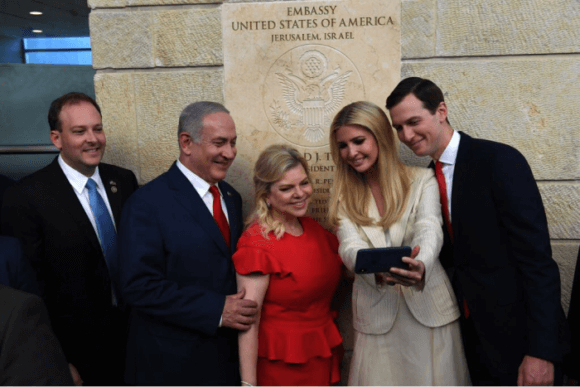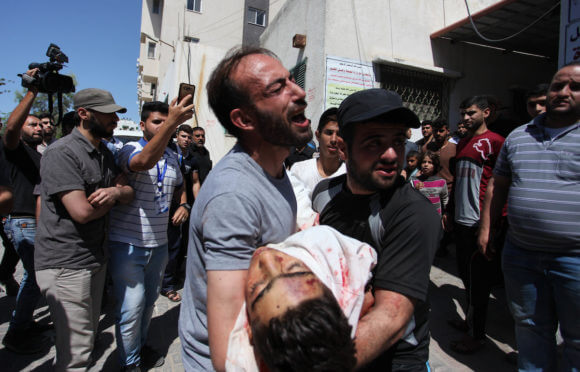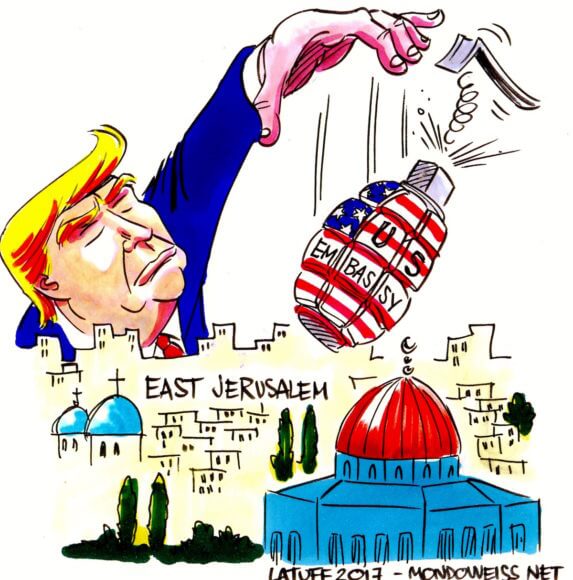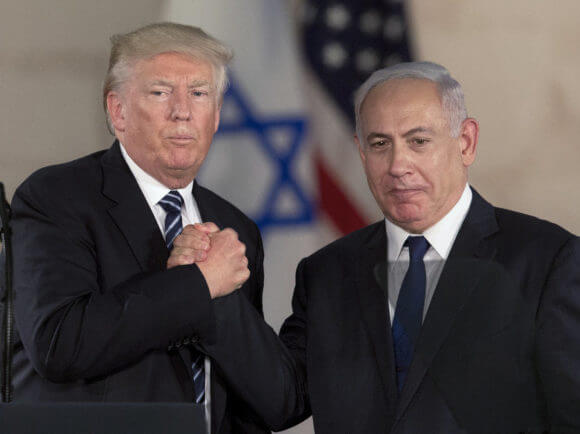One year ago, US President Donald Trump announced that he was officially recognizing Jerusalem as the capital of Israel, breaking with decades of US and international foreign policy in the region.
The announcement sparked widespread protests across the occupied Palestinian territory and Gaza, some of which are still continuing today.
The political implications of Trump’s decision were clear: the US was virtually erasing any Palestinian claims to the city, specifically occupied East Jerusalem, which Palestinians maintain must be the capital of their future state.
As Trump put it, he “took Jerusalem off the table,” essentially “giving” the city to Israel, its unlawful occupier, and forcing the Palestinians to concede to negotiations on other ancillary issues.
At the time, through protests and halting diplomatic ties with the US, the Palestinians refused to accept Trump’s self ordained right to take or leave certain final status issues off the negotiations table.
The worst possible damage, it seemed, had already been done.
But over the course of the next year, Trump and his administration would announce and enact a series of measures against the Palestinians in an effort to wear them down until they were forced to come to Trump and Netanyahu’s negotiating table and take whatever they could get.
Trump’s year in Palestine: a timeline
Following Trump’s announcement, the US government began preparations to move the US Embassy for Tel Aviv to Jerusalem, a plan Trump had been touting since the campaign trail.
Until Trump, countries had kept their Israeli embassies in the internationally recognized capital of Israel, Tel Aviv, in order to avoid being impacting negotiations between Israel and the Palestinians on the future of Jerusalem.
In January, the US slashed its funding to UNRWA, the UN agency responsible for providing essential services to Palestinian refugees, in half, paying $60 million to the agency instead of a promised $365 million.
On May 14, Trump’s daughter Ivanka and her husband Jared Kushner, a senior advisor to the President, traveled to Jerusalem for the embassy opening.

The inauguration of the new embassy coincided with the 70th anniversary of the Palestinian Nakba, or “catastrophe,” when more than 750,000 Palestinians were forcibly expelled from their homes when the state of Israel was established in 1948.
On August 24, the US State Department announced that it would be cutting $200 million in funding to the Palestinian Authority (PA) for projects in the West Bank and Gaza, and would re-route the money to “high-priority projects elsewhere.
Palestinian officials came out in full force against the decision, accusing the US of employing “coercion” tactics and “political blackmail.”
Just one week later, the US announced it would be ending all financial support for UNRWA, putting the agency at increased risk of shutting down, and their more than 5 million registered Palestinian refugees at risk of losing critical education, work programs, and food assistance services.
On September 8th, Trump ordered that $25 million earmarked for the care of Palestinians in East Jerusalem hospitals be directed elsewhere as part of a “review of aid.”
The Palestinian Foreign Ministry criticized the aid cut as part of a U.S. attempt “to liquidate the Palestinian cause,” saying it would threaten the lives of thousands of Palestinian patients and hospital employees.
Two days later, the Trump administration ordered the Palestinian representative office to close, ending the near 25-year diplomatic presence of the PLO Mission in Washington DC.
State Department Spokesperson Heather Nauert told reporters that the decision was made after Palestinian leaders refused to “advance the start of direct and meaningful negotiations with Israel.”
Last month, reports emerged that in efforts to pressure Palestinian President Mahmoud Abbas into peace talks, the United States Agency for International Development (USAID), which provides millions of dollars in project-based aid each year to the Palestinian territories, would be completely shutting down operations in 2019.
Since it began operating in 1994, USAID has invested about $5.5 billion in the West Bank and Gaza through the construction of roads, water infrastructures, schools, clinics and community centers.
Human Impact
Over the course of the year, as each US decision was followed up with more outcry and condemnation from Palestinian officials, the true impact of Trump’s foreign policy changes was most intensely felt by some of the most vulnerable communities across occupied Palestine and the diaspora.
In the immediate aftermath of Trump’s announcement recognizing Jerusalem as Israel’s capital, hundreds of Palestinians were arrested during protests in the West Bank and East Jerusalem.
The Palestinian Prisoner’s Society reported just three weeks after the decision that 490 Palestinians, including 148 minors and 11 women, had been arrested by Israeli forces.
Between December 14th-20th, 2017, four civilians were killed by Israel, including a double leg amputee, in the West Bank and Gaza Strip during related protests, according to the Palestinian Center for Human Rights.
The group added that 256 Palestinian civilians, including 29 children, five journalists and four paramedics, were also wounded.
On May 14th, while US officials celebrated the embassy opening in Jerusalem, Israeli forces were gunning down Palestinians along the Gaza border.

Gazans had launched weekly, and eventually daily, Great March of Return protests six weeks earlier, but the demonstrations peaked on the 14th as Palestinians protested the embassy move and commemorated 70 years since the Nakba.
Tens of thousands of protesters took to the Israeli border fence on that day. By May 15th, some 62 Palestinians had been killed by Israeli soldiers, in the deadliest day in Gaza since the 2014 war.
In July, scenes of chaos erupted in Gaza City after UNRWA announced that it would be laying off hundreds of its employees following January’s massive US budget cuts. One Palestinian man, an employee at UNRWA, attempted to set himself on fire.
Following Trump’s decision to completely stop US funding to UNRWA at the end of August, Chris Gunness, the agency’s spokesman, warned of a “doomsday scenario” when UNRWA’s funds do dry out,.
“Let there be no mistake; this decision is likely to have a devastating impact on the lives of 526,000 children who receive a daily education from UNRWA; 3.5 million sick people who come to our clinics for medical care; 1.7 million food insecure people who receive assistance from us, and tens of thousands of vulnerable women, children and disabled refugees who come to us,” he told Al Jazeera.
In October, Israel’s Jerusalem Mayor, Nir Barkat, announced that he would be shutting down all UNRWA operations in the city by 2019, a move he said was inspired by Trump’s UNRWA cuts.
Barkat said he plans to end the agency’s services in schools, clinics and sports centers, among others, and transfer the operations to Israeli authorities. UNRWA schools in East Jerusalem serve around 1,800 Palestinian children.
Between September and November, Saudi Arabia barred 1.5 million Palestinian citizens of Israel, along with Palestinian refugees living in Jordan and Lebanon, and Palestinian residents of East Jerusalem, from getting visas to Saudi Arabia for the Hajj pilgrimage.
Reports at the time speculated the move was made in accordance with Trump’s efforts to “take the refugee issue off the table,” by pressuring Jordan and Lebanon into naturalizing Palestinian refugees in the countries, therefore stripping millions of their refugee status
What happens next?
One year on, and Palestinian leaders are maintaining their boycott of the US administration.

Abbas and his officials have widely denounced the US tactics over the past year, saying they won’t enter into any negotiations under the current circumstances.
In October, Palestinian leaders filed a complaint with the top court of the UN, the International Court of Justice (ICJ), over the U.S. decision to recognize Jerusalem as the capital of Israel.
Despite this, Trump is moving forward with his so-called “deal of the century,” which he has been claiming, for months, will solve the decades long conflict. In September, he said it would be released within two to four months.
But with refugees and Jerusalem allegedly “off the table,” and Israeli settlement expansion on a steady post-Trump rise, Palestinians and their supporters are skeptical that a plan put forward by the Trump administration could offer any semblance of justice for Palestinians.



For all the hurt, heartache, violence, and disappointment, resulting in Trump’s/Netanyahu/Kusher arrogance,( in contrast to the resolve by other US Presidents), giving Jerusalem on a golden platter purchased by Adelson, I hope Trump, Netanyahu, and Kushner, get their just desserts, and get charged with the crimes they are suspected of committed. They are ALL under investigation, and in serious trouble. They are evil.
Nothing like kicking a dog when its down, and kicking, kicking, kicking….yet any
Americans, Jewish or Gentile, who manage to visit Palestinians in their homes are always treated with great hospitality. Hats off to the Palestinian character.
This is a timeline of unconscionable and intentional cruelty, which unfortunately, is in keeping with the character of the current u.s. administration. Opening the american embassy at it’s new, completely wrong location on the anniversary of the nakba, a day when 60 palestinian protesters were executed while the champagne was still flowing. There is no action which isn’t deliberate in its inhumanity. And the shiny happy grimaces of jared kushner and ivanka trump, along with the netanyahoos, make it all the more sadistic.
‘In January, the US slashed its funding to UNRWA, the UN agency responsible for providing essential services to Palestinian refugees, in half, paying $60 million to the agency instead of a promised $365 million.’
The rest of the world isn’t getting out of this one. While the current renter on 1600 Pennysylvania was making his plans known, there was time for other countries to come up with a way to make up the difference?
Trust mondoweiss to fall over flat on its face in highlighting a positive with a negative.Moving the embassy was a brilliant move as it forces both sides to reconsider there ages old stalemated positions.Two sides are fighting over an asset.Remove the asset and they stand there facing each other all dressed up with nowhere to go.The band has moved on but the music lingers except it sounds more like a whine.Much like the whine of this patel palette of stale ideas.
The message is clear.Attack jerusalem and you attack the usa.
@edithspark
Check your meds dosage instructions. I think you have had another one of those dizzy spells as in WTF are you rambling on about.